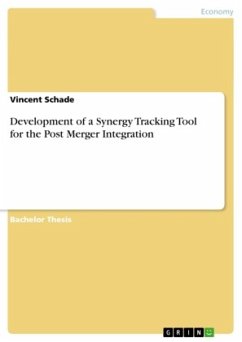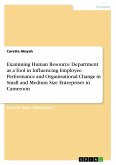Bachelor Thesis from the year 2010 in the subject Business economics - Investment and Finance, grade: 1,3, University of Applied Sciences Bonn-Rhein-Sieg ; Rheinbach, language: English, abstract: In Business Development, Mergers & Acquisitions (M&A) have become an increasingly attractive growth opportunity among companies over a long period of time. Nowadays, there is hardly a day where current developments of ongoing M&A transactions or speculations about presumed M&A deals cannot be followed in the daily press. Other external growth opportunities, such as strategic alliances, joint ventures, and franchising (inorganic growth) are still behind M&A as a strategic alternative. Organic growth, which can be achieved by increasing sales personnel, developing new products or expanding in new geographical areas, presents another alternative. Nonetheless, M&A are often preferred because they provide a faster way to enter new markets and to make operations more efficient. Moreover, the constantly increasing global competition, strengthened through lowered market entry barriers and trade enhancing conventions between several countries, contribute to an increased consolidation pressure among businesses. However, it turned out that M&A are fairly sensitive projects that are vulnerable to fail. It is proved that a huge number of M&A did not deliver on their promises. The majority of failed M&A are a result of mismanagement during the Post Merger Inte-gration (PMI) when processes have to be adjusted, personnel need to be teamed up and corporate cultures have to be reconciled. During the PMI, synergies, as the dominant motive for M&A, which are identified before the transaction, have to be realized. However, synergies can frequently not be realized due to a poor quality of information, a high level of complexity or bad implementation strategies. In spite of these difficulties, many companies have not established a well-functioning synergy management and synergy tracking in their organizational structures yet. This thesis deals predominantly with aspects of synergy management whereby the main focus is on synergy tracking as a support function of the synergy management. An emphasis is on the analysis of realization efforts that need to be done by the management during the PMI. To provide a solution and ease the aforementioned issues of synergy realization, a synergy tracking tool, which serves as an effective support instrument during the PMI is developed.
Hinweis: Dieser Artikel kann nur an eine deutsche Lieferadresse ausgeliefert werden.
Hinweis: Dieser Artikel kann nur an eine deutsche Lieferadresse ausgeliefert werden.








